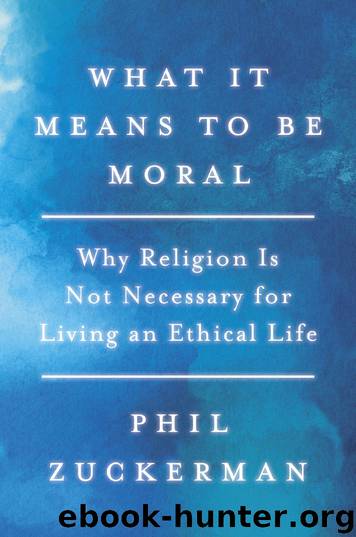What It Means to Be Moral by Phil Zuckerman

Author:Phil Zuckerman
Language: eng
Format: epub
ISBN: 9781640092754
Publisher: Counterpoint
Published: 2019-06-20T16:00:00+00:00
Morality and the Secular Seven
It is clear how empathy and compassion—as constituents of the secular seven—are related to morality. After all, it was empathy and compassion that motivated Dr. Semmelweis to test his observation and then publish his findings that handwashing lowered rates of infection; he pursued the matter until his death because he wanted to battle puerperal fever and other such deadly infections that caused so many patients to suffer and die. It was empathy and compassion that prodded Johann Struensee to abolish slavery and torture in Northern Europe in the eighteenth century. Or Jawaharlal Nehru to fight for the rights of impoverished peasants in the Indian hinterlands.
As for the remaining secular virtues, they, too, help sustain a healthy, hearty morality in a myriad of ways. The value of freethinking allows us to consider various perspectives on any and all topics, ponder counterarguments, learn about others’ experiences, and question everything without fear of cosmic calamity or divine wrath. This orientation improves knowledge of justice, increases understanding of fairness, hones our ability to be rational and reasonable, and ever widens our worldview, all of which are necessary to sustaining a full, rich ethical life. The secular tendency to live in reality helps us to accept things for how they really are—not how we wish or hope them to be. This means that we don’t rely on prayer or other such magical thinking to alleviate suffering. We have to take thoughtful and deliberate action—and be attentive to those practices and policies that are actually effective in alleviating suffering. We then base our moral choices on what proves to be effective, not merely what we wish or hope to be the case. This relates to the secular orientation of here-and-nowness; because this time and this life are all there is, if we want to increase well-being and decrease misery, we have to do it ourselves in the here and now.69 Such is the moral imperative of secular living, for no gods or gurus will save us. Concomitantly, an abiding acceptance of existential mystery allows us to focus on the things we can know and experience, rather than obsess, argue, or ruminate about the deep questions of Being and Existence. Morally, this means that we can more responsively focus on those around us—family, friends, neighbors, colleagues, our fellow human beings around the planet, and other forms of sentient life, as well—in calibrating our actions and intentions so as to be kinder, gentler, and more supportive. And as for scientific empiricism—it is crucial for ethical living. While science, being a mere method, cannot tell us what to value or determine what it ultimately means to be moral, it can help us understand the best ways to achieve certain agreed-upon moral ends. So, for example, if we can agree that curing a painful disease is desirable, or that we ought to eliminate poverty, or that global warming is inimical to the well-being of sentient creatures, science and empiricism are the best avenues to tread for possible solutions.
Download
This site does not store any files on its server. We only index and link to content provided by other sites. Please contact the content providers to delete copyright contents if any and email us, we'll remove relevant links or contents immediately.
| African-American Studies | Asian American Studies |
| Disabled | Ethnic Studies |
| Hispanic American Studies | LGBT |
| Minority Studies | Native American Studies |
Cecilia; Or, Memoirs of an Heiress — Volume 1 by Fanny Burney(32533)
Cecilia; Or, Memoirs of an Heiress — Volume 2 by Fanny Burney(31931)
Cecilia; Or, Memoirs of an Heiress — Volume 3 by Fanny Burney(31923)
The Great Music City by Andrea Baker(31907)
We're Going to Need More Wine by Gabrielle Union(19028)
All the Missing Girls by Megan Miranda(15909)
Pimp by Iceberg Slim(14472)
Bombshells: Glamour Girls of a Lifetime by Sullivan Steve(14042)
For the Love of Europe by Rick Steves(13840)
Talking to Strangers by Malcolm Gladwell(13338)
Norse Mythology by Gaiman Neil(13325)
Fifty Shades Freed by E L James(13224)
Mindhunter: Inside the FBI's Elite Serial Crime Unit by John E. Douglas & Mark Olshaker(9305)
Crazy Rich Asians by Kevin Kwan(9267)
The Lost Art of Listening by Michael P. Nichols(7485)
Enlightenment Now: The Case for Reason, Science, Humanism, and Progress by Steven Pinker(7300)
The Four Agreements by Don Miguel Ruiz(6735)
Bad Blood by John Carreyrou(6606)
Weapons of Math Destruction by Cathy O'Neil(6253)
